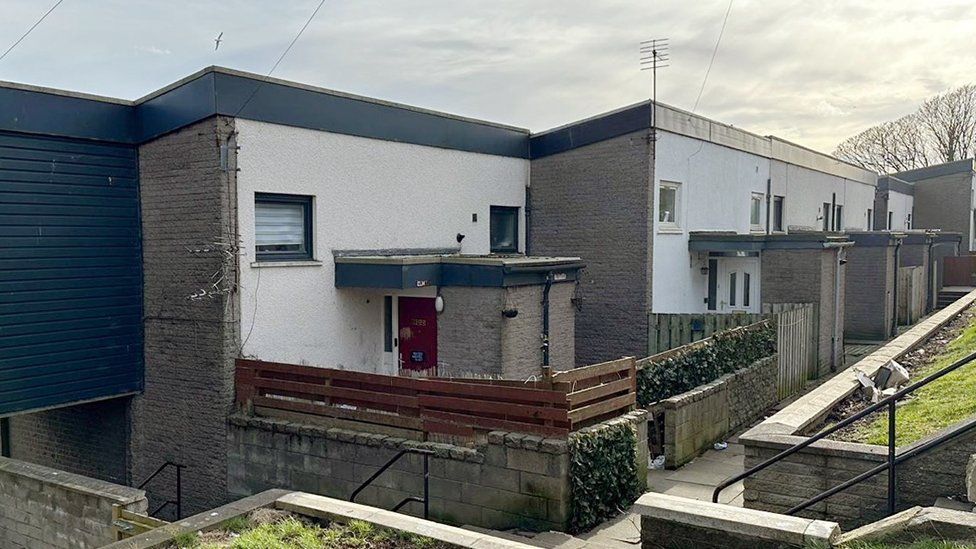Hundreds to be rehomed in Aberdeen over RAAC fears
- Published

Hundreds of people are being moved out of their council homes in Aberdeen after the houses were found to contain potentially dangerous concrete panels.
Thousands of council homes in the city were checked for the presence of reinforced autoclaved aerated concrete (RAAC).
It was found to be in about 500 homes in the Balnagask area of Torry, including 364 council properties.
The council said it was doing everything it could to support tenants.
BBC Scotland News understands the council hopes the majority of council tenants will be rehomed by the end of the summer.
Sixty five of the council properties are currently unoccupied.
RAAC is a cheap version of concrete that was used mostly in construction between the 1950s and 1990s.
It has a lifespan of about 30 years and concerns have mounted about the impact of water ingress on its safety.
The Health and Safety Executive said it was now beyond its lifespan and may "collapse with little or no notice".
In Aberdeen, an independent structural engineers' report recommended that council tenants should be relocated to alternative accommodation within the city as soon as possible.
Councillors on Thursday's urgent business committee accepted that tenants should be permanently rehomed.
Council officers are currently exploring options for the long-term viability for the site, which include remedial works or demolition.
A detailed appraisal will be presented to the council within six months.
Some council tenants reacted with anger.
Mother-of-three Camille Livingstone, 33, told BBC Scotland News she had no plans to move house.
"I'm not moving," she said. "To expect people to get up and move without giving us any information about it is ridiculous.
"My daughter has ADHD and autism so to uproot her alone, as well as my other daughters, and cats and the dog, it's going to be massive.
"I'm not keen on the idea, not at all.
"This is my home, my kids' home and it was my mum's house before it was my house. She was here just over 15 years and I've been here almost nine."
Council tenant Irene Jacobson, 51, who has two sons still at school, said she was feeling "very worried and apprehensive".
"I don't really want to move as we've been here that long and I'm used to the area," she said, adding that one of one of her sons has a learning disability so it would cause a lot of upheaval for him having to settle into a new routine.
"It's a bit of a shock to take it all in," she said.
Hayley Urquhart, 28, said: "I'm a bit disappointed. I don't want to move. I've just moved back to Torry so I'm quite sad.
"I've got two kids, one with autism and one with ADHD. They find it difficult transitioning and changing so it would mean a lot.
"If I've got to move, I want to be in a house again and I would like to come back to my original house."
Councillor Miranda Radley, convener of the communities, housing and public protection committee, said: "This is an incredibly difficult situation for everyone living in a RAAC-affected property, but the council will be doing everything we can to support our tenants during this hugely challenging time.
"These are people's homes and we need to ensure we support our tenants, but also engage with owners and privately rented tenants, to keep them informed on this matter."
Rehoming funding
Councillors agreed to set aside an initial £3m to cover the rehoming programme.
A spokesperson for council body Cosla said: "We treat the safety of everyone within any council provided building, house or facility extremely seriously.
"Scottish local authorities have regular inspections of their buildings estate, put in place mitigations as appropriate and if required close some buildings or move some residents where this is required as we have seen Aberdeen do today."
As of December, 2023 The number of social landlord homes across Scotland identified with RAAC was 1,150 and the number under investigation that may have RAAC present was 29,572.
- Published3 October 2023
- Published25 September 2023
- Published18 September 2023
- Published7 September 2023
- Published6 September 2023